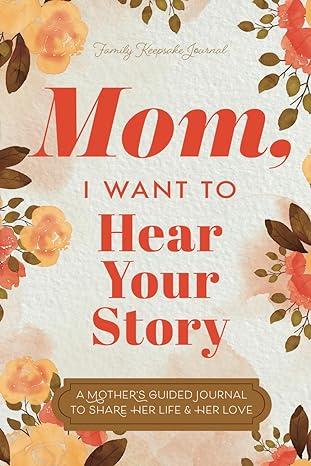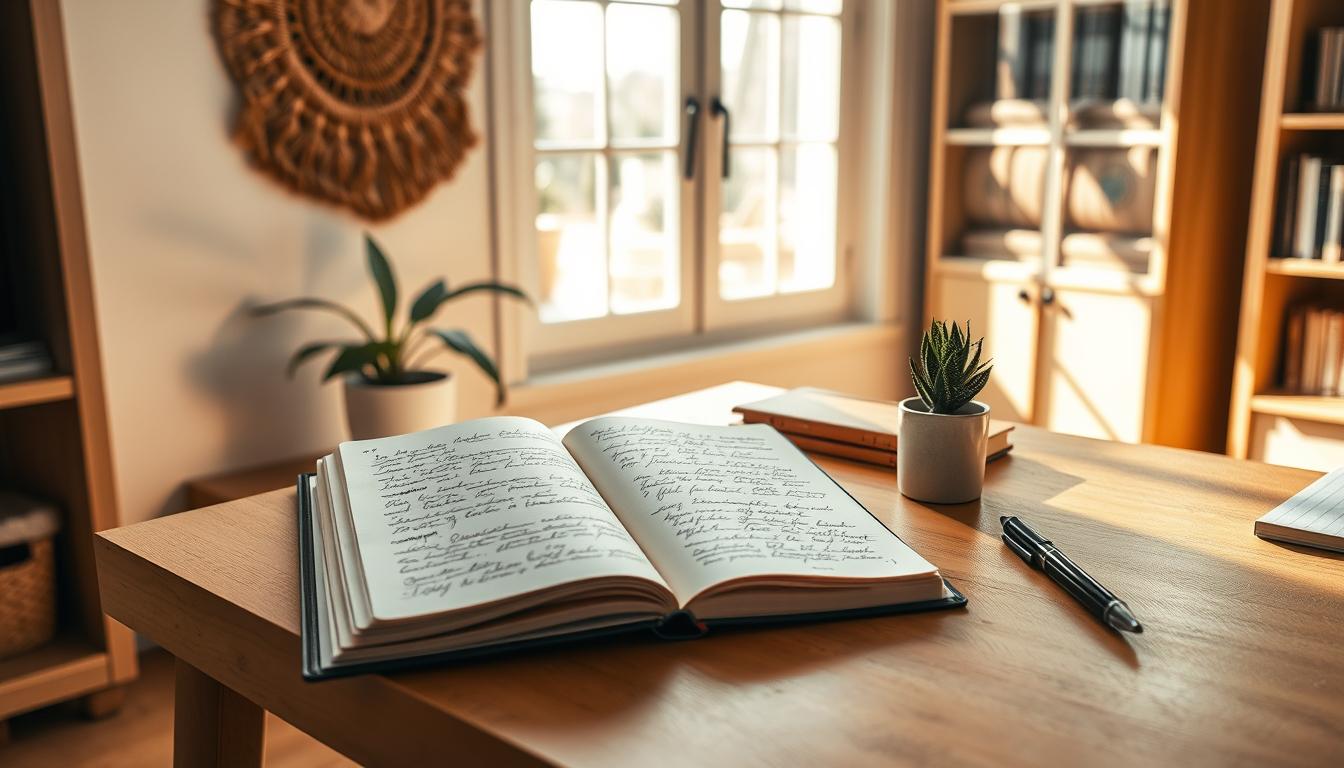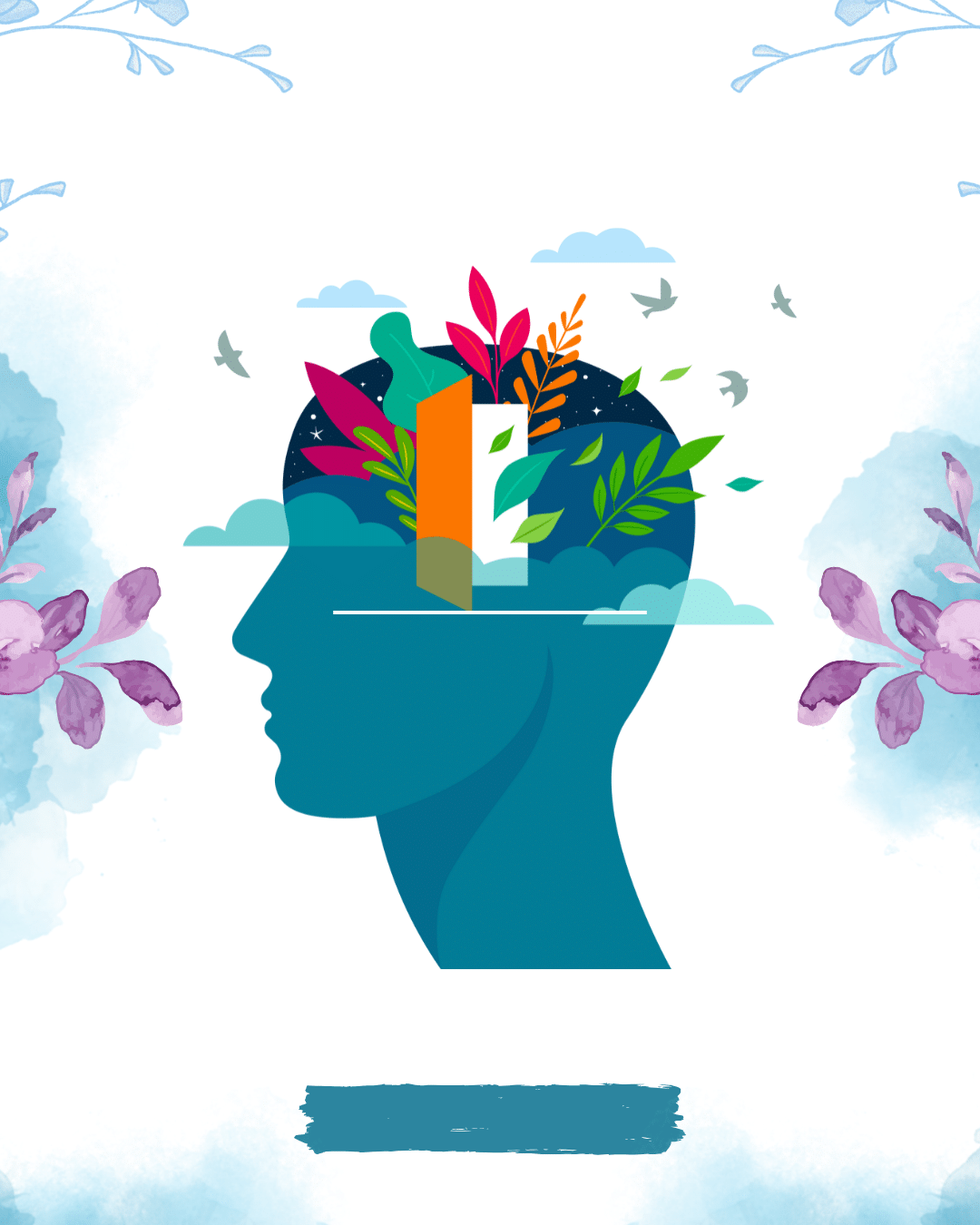
Welcome to the world of journaling for self discovery! This daily writing practice is a powerful way to understand yourself better. Your mind is full of stories, and a journal helps you explore them.
Journaling is more than just writing down events. It’s a deep way to explore yourself. It helps you understand your feelings, track your growth, and see your inner world clearly. By writing regularly, you create a safe space to connect with your true self.
The beauty of journaling is how simple it is. You don’t need special skills or fancy tools. Just your thoughts, a pen, and a willingness to be open. Each page reflects your inner world, showing insights you might not see elsewhere.
By starting to journal, you open yourself to amazing personal growth. Your experiences become lessons, challenges become opportunities for growth, and dreams find a place to grow.
Table of Contents
Are you ready to start this journey of self-understanding? Let’s see how journaling can be your best friend in personal growth.
Understanding the Power of Journaling Practice
Journaling is more than just writing in a notebook. It’s a powerful tool for personal growth, emotional healing, and self-discovery. Daily journal prompts can unlock incredible insights into our inner world, changing how we see ourselves.
Research shows amazing benefits from writing regularly. Scientists found that reflective writing exercises can greatly improve mental health. They reduce stress and boost emotional intelligence.
Exploring the Benefits of Regular Writing
Our journaling journey offers many advantages:
- Stress reduction and emotional regulation
- Enhanced self-awareness
- Improved problem-solving skills
- Increased creativity and mental clarity
The Neurological Impact of Self-Reflection
Neuroscientific studies show that intentional writing builds new neural pathways. Reflective writing exercises change how our brain processes emotions. This helps us develop healthier ways to cope.
Diverse Journaling Approaches
Not all journaling is the same. Some like structured prompts, while others prefer free-form writing. The important thing is finding a method that fits your style and emotional needs.
“Writing is a powerful way to understand ourselves and our experiences.” – Dr. James Pennebaker, Psychology Researcher
We encourage you to try these journaling techniques. Discover the transformative power of putting pen to paper.
Getting Started with Journaling for Self Discovery
Starting a journaling journey can be both thrilling and a bit scary. Begin with small steps and be gentle with yourself. Journaling is a private space to dive into your deepest thoughts and feelings without fear of judgment.
Here are some key steps to start your journaling:
- Choose a journal that speaks to you: Pick a notebook that feels welcoming
- Create a consistent writing routine that fits your lifestyle
- Set realistic expectations for your gratitude journaling practice
- Embrace imperfection in your writing process
Choosing the right tools can make your bullet journaling better. Here are some important things to consider:
- High-quality journal with smooth pages
- Comfortable writing instruments
- Soft lighting for a gentle feel
- Inspiring visual elements
Here are some practical journals to explore and choose from:
*This post contains affiliate links, if you make a purchase through one of the links, I may earn a commission at no additional cost to you.
Your journaling should be a natural and fun experience. Start with short, five-minute writing sessions. Don’t worry about perfect grammar or structure – focus on expressing yourself and reflecting.
“Writing is a powerful tool for understanding ourselves and processing our experiences.”
For a smooth start, set a daily writing time, create a cozy journaling spot, and keep your journal handy. Gratitude journaling is great for boosting positivity and noticing the little joys in life.
There’s no one “right” way to journal. Your approach will grow as you explore this powerful tool for self-discovery.
Creating Your Sacred Writing Space
Creating a special journaling area turns writing into a meaningful ritual. We mix mindfulness journaling with design to make your space perfect. This way, your creative spirit will feel right at home.
Designing Your Inspirational Environment
Your journaling area should show your inner world. Make a calm atmosphere that encourages deep thinking and creativity. It could be a cozy corner or a special desk. Always choose comfort and personal touch.
“A sacred writing space is where your thoughts find their home.” – Creative Journaling Wisdom
Establishing Meaningful Writing Rituals
Start routines that tell your mind it’s time to journal. Small steps like making tea, lighting a candle, or playing soft music can help you get into a reflective mood.
Remember, your journaling space is your own sanctuary. Try new things, adjust, and make a place that supports your creativity and inner peace.
The Therapeutic Elements of Daily Writing
Journaling is a powerful way to heal emotionally and discover yourself. It turns our writing into a safe space to explore our deepest thoughts and feelings. Daily writing helps us process complex emotions and release stress.
Journaling does more than just keep a record. It connects us deeply with our inner world. This practice helps us:
- Reduce stress and anxiety
- Clarify complicated emotions
- Develop greater self-understanding
- Create emotional resilience
“Writing is a form of therapy; sometimes I wonder how all those who do not write, compose, or paint can manage to escape the madness, melancholia, the panic and fear which is inherent in a human situation.” – Graham Greene
Our daily writing is a personal conversation with ourselves. By making journaling a regular habit, we turn blank pages into tools for mental health. Each word we write is a step towards healing and growth.
Science backs up the benefits of expressive writing on mental health. Studies show that regular journaling lowers depression symptoms, boosts the immune system, and improves emotional control.
Mindfulness and Self-awareness Through Journaling
Journaling daily is a powerful way to understand ourselves better. Our inner world is complex, filled with emotions, thoughts, and experiences. Visual journaling turns this internal landscape into a tangible, meaningful exploration of self.
Our journey of self-discovery starts with creating a safe, non-judgmental space for reflection. Through consistent writing, we can develop a deep connection with our inner voice.
Connecting with Your Inner Voice
Learning to listen to our inner voice takes patience and practice. Visual journaling engages multiple senses:
- Use colours to represent emotions
- Sketch quick drawings alongside written entries
- Create mind maps of your thoughts
- Experiment with different writing styles
Processing Emotions Through Writing
Writing becomes therapeutic when we approach it with openness. Emotional processing happens naturally when we express feelings freely.
Building Self-reflection Habits
Consistent journalling daily practices build self-awareness. Start small: write for just 5-10 minutes each day. Your insights will grow with your practice.
“The most important conversations you’ll ever have are the ones you’ll have with yourself.” – David Goggins
Transformative Journaling Techniques
Unlocking self-discovery is more than just writing. Our daily writing can be a powerful tool for change. It becomes transformative when we use it with purpose and creativity.
There are many reflective writing exercises that can take you deeper into yourself:
- Stream of Consciousness Writing: Write for 10 minutes without stopping or editing. This method helps you see your true thoughts.
- Dialogue Journaling: Imagine talking to different parts of yourself. It helps you understand your inner conflicts.
- Future Self Visualization: Write a letter to your future self. It’s a way to get advice from your future self.
“Writing is a powerful method of understanding oneself, transforming experiences into insights.” – Julia Cameron
Remember, your journal is a safe space for growth. It’s where you can explore and understand yourself better. Each entry is a chance to get closer to your true self.
Writing every day can become a ritual of change. By doing these exercises regularly, you’ll learn more about yourself and your feelings.
Overcoming Common Journaling Challenges
Journaling for self care isn’t always easy. Every writer faces obstacles that can stop their practice. Knowing these challenges helps us grow and discover ourselves.
Our journey with journaling isn’t straight. Some days are easy, while others are tough. Recognizing these challenges is key to a strong writing practice.
Breaking Through Writer’s Block
Writer’s block can stop even the most committed journalers. Here are ways to beat it:
- Use prompt cards to spark inspiration
- Set a timer for 10-minute free writing sessions
- Write about your immediate sensory experiences
- Explore unexpected emotions or recent memories
Maintaining Consistency
Keeping up with journaling needs gentle commitment. Set realistic goals and flexible routines that fit your life.
- Start with short, 5-minute daily entries
- Choose a consistent time of day
- Keep your journal accessible
- Forgive yourself for missed days
Dealing with Self-criticism
Your journal is a safe place for true thoughts. Let go of the need for perfection. Journaling is about growing, not writing perfectly.
Your journal doesn’t judge—so why should you?
Write with kindness, curiosity, and openness to self-discovery.
Tracking Personal Growth Through Journal Entries
Looking back at your journal entries is like seeing a map of your emotional journey. It shows how you’ve grown and discovered yourself. Journaling helps you see your own changes and growth.
Tracking your progress through journaling can be very enlightening. Here are some tips to make the most of this practice:
- Create a timeline of personal achievements
- Note emotional patterns and triggers
- Reflect on gratitude journaling insights
- Identify recurring themes in your writing
Gratitude journaling is key to personal growth. It helps you see the good in life and feel better mentally. Try these ideas:
- Date each journal entry for easy tracking
- Use colour-coded markers to highlight emotional states
- Review entries quarterly to recognize patterns
Your journal is a living document of your personal evolution – embrace every page as a testament to your journey.
When you look back at old entries, do so with kindness and interest. See how your views and feelings have changed. Celebrate the growth you’ve shown in your journaling journey.
Integrating Different Journaling Styles
Journaling isn’t for everyone in the same way. We can make our journaling special by mixing different styles. Think of your journal as a canvas where you can use many techniques to learn more about yourself.
Our journaling toolkit has many ways to explore your inner world. Let’s look at some exciting methods to change how you write:
Gratitude Journaling: Cultivating Positivity
Gratitude journaling makes us focus on the good things in life. By writing down what we’re thankful for each day, we learn to see the joy. Here are some easy tips:
- Write three things you’re grateful for each day
- Describe why these moments matter to you
- Reflect on small, often overlooked blessings
Stream of Consciousness Writing
This method lets us clear our minds by writing freely. Bullet journaling can help organize your thoughts. Just start writing without stopping or editing.
Goal-Setting Journals
Visual journaling is great for tracking goals. Create special sections for:
- Short-term goals
- Long-term aspirations
- Progress tracking
By mixing these journaling styles, you’ll have a rich and varied practice. It will show your unique inner world.
Conclusion
Journaling for self discovery is a powerful way to grow and understand yourself. Your journal is more than just pages. It’s a tool that unlocks your inner wisdom and brings emotional clarity.
Daily journal prompts can lead to deep insights. They help you understand your emotions better. This way, you can navigate life’s ups and downs with more awareness.
Starting a journaling practice is about connecting with yourself, not being perfect. Each page is a step towards understanding yourself better. It’s a safe space to share your thoughts, dreams, and challenges.
Whether you like structured writing or free reflection, find what works for you. The goal is to explore yourself genuinely.
Journaling is a personal journey with no strict rules. Some days, your entries might be short emotional notes. Others could be detailed, deep stories.
Be patient and kind to yourself as you journal. Let your journal be your guide in self-discovery and growth.
By journaling regularly, you’re improving your emotional intelligence and mental health. Your journal is a powerful tool for change, healing, and self-understanding. It’s a place where your true self can grow and thrive.












